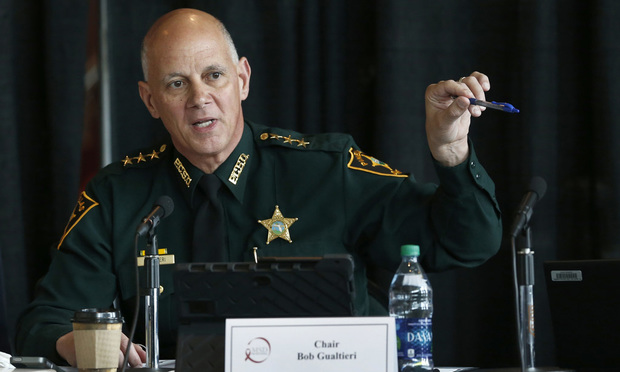State Safety Panel Backs Controversial Armed Teacher Law
“You've got to have somebody there who can swiftly and effectively neutralize the threat, and that means killing the killer,” Pinellas County Sheriff Bob Gualtieri said.
December 14, 2018 at 12:12 PM
6 minute read
 Pinellas County Sheriff Bob Gualtieri (AP Photo/Wilfredo Lee, File)
Pinellas County Sheriff Bob Gualtieri (AP Photo/Wilfredo Lee, File)
A controversial law that allows trained “guardians” to bring guns to public schools didn't go far enough — gun-savvy teachers also should be able to have weapons in the classroom.
That's the near-unanimous view of a state panel created to make recommendations to beef up school security in the wake of one of the country's deadliest mass school shootings on Valentine's Day in Broward County.
“You've got to have somebody there who can swiftly and effectively neutralize the threat, and that means killing the killer. The only way you are going to do that is if you have a good guy with a gun who can take that action,” Pinellas County Sheriff Bob Gualtieri, who chairs the Marjory Stoneman Douglas High School Public Safety Commission, said in an interview Thursday.
Max Schachter, whose 14-year-old son, Alex, was among the students slain at Marjory Stoneman Douglas and who serves on the panel, was the lone holdout in a 13-1 vote on the proposal Wednesday.
“I understand the sheriff's point that we do need more good guys with a gun on campus,” Schachter said, adding, “nobody understands that wish … more than myself.”
But he said he doesn't think teachers should carry guns.
“I think they have enough on their plate,” he said.
Debbi Hixon, a teacher, agreed. Her husband, Chris, was the Parkland school's athletics director and wrestling coach and was among the victims.
Teachers already have to prepare students for standardized tests and are responsible for their emotional and physical well-being, Hixon said.
“To add the burden of knowing that you're responsible for taking out a shooter if they come into your room, even if a teacher thinks they are up to that task, I just think it is unfair to have that expectation for them,” she said Thursday.
Under the proposal, which would require legislative action, teachers who have concealed-weapons licenses, just like school “guardians” already authorized in the law, would be able to get extra training and bring guns to school.
The commission has spent months delving into the Feb. 14 catastrophe in which 14 teenagers and three faculty members were killed and 17 others were injured.
Confessed killer Nikolas Cruz, a former student at the school, had a lengthy history of interactions with law enforcement and mental-health professionals.
The commission, which spent eight months delving into details about Cruz's background, the response to the shooting by the Broward County Sheriff's Office and local police departments and crafting recommendations, met Wednesday and Thursday in Tallahassee to finalize a sweeping report that deals with everything from failings in law-enforcement communications systems to the need for bullet-proof windows in school buildings.
The report was highly critical of the manner in which state, local and federal officials dealt with, or neglected to deal with, Cruz. The recommendations include a number of items focused on better coordination between mental-health, education and law-enforcement agencies, something that was also required in a 2018 law passed in response to the shooting.
Also included in the law, quickly passed and signed by Gov. Rick Scott weeks after the shootings, was the controversial guardian program, which drew pushback from educators, parents and others. Lawmakers eventually settled on a compromise requiring school districts and sheriffs to approve the program for it to go into effect in counties.
The commission's approval last week of the recommendation to allow armed teachers on school campuses quickly drew criticism from anti-gun rights advocates.
Allowing teachers to have guns is “a bad idea,” the Florida Coalition to Prevent Gun Violence said in a news release.
“Instead of arming teachers, whose only job should be to teach our children, we call on the Legislature and Gov.-Elect [Ron] DeSantis to allocate proper and recurring funding for programs that include much-needed counseling and intervention services for young people along with de-escalation techniques and better environmental designs for Florida's schools,” the group said.
But Gualtieri defended expanding the law.
“There are simply not enough cops to go around. So, if there are not enough cops to go around, then the best way to comply with that is to use the law to its maximum and allow the guardians to perform that function,” he told reporters during a break in Thursday's meeting.
Under the law, school districts are permitted to hire guardians, people who have special training by county sheriffs but who are not full-time classroom teachers, to patrol school campuses. School boards must approve guardian programs by a majority vote, but sheriffs are not required to provide the training.
The law also requires each school in the state to have at least one school resource officer, which is usually a sheriff's deputy, or a guardian.
About two dozen of the state's 67 districts have opted for the guardian program as a cost-saving measure, because deputies are more expensive. Other sheriffs maintain they lack the manpower or funding to assign a resource officer to each school because the law enforcement training is more intensive than the training for guardians.
Decisions by some sheriffs to not implement the guardian program, even after county school officials said they wanted it, frustrated several members of the commission, which was finalizing a 407-page draft report in advance of a Jan. 1 deadline for recommendations to be complete.
Some sheriffs are refusing to train the guardians because their insurance providers have warned about potential liability, according to commission member Grady Judd, sheriff of Polk County.
“What we have right now is the St. Bernard-tail wagging the chihuahua dog,” Judd said. “I'm dadgum passionate about this. … I'm recommending that we change 'may' to 'shall,' at the request of the majority of the school board.”
The commission unanimously approved the recommendation, which was supported by Schachter and Ryan Petty, whose 14-year-old daughter, Alaina, was one of the slain Parkland students.
“I don't think anyone should have, including the sheriffs of this state, should have any wiggle room to get around the legislative intent of (SB) 7026,” Petty said, referring to the legislation that passed earlier this year. “Sheriffs shall establish a guardian program.”
Dara Kam reports for the News Service of Florida.
This content has been archived. It is available through our partners, LexisNexis® and Bloomberg Law.
To view this content, please continue to their sites.
Not a Lexis Subscriber?
Subscribe Now
Not a Bloomberg Law Subscriber?
Subscribe Now
NOT FOR REPRINT
© 2025 ALM Global, LLC, All Rights Reserved. Request academic re-use from www.copyright.com. All other uses, submit a request to [email protected]. For more information visit Asset & Logo Licensing.
You Might Like
View All
Florida Judge Denies Motion to Dismiss in $150M Plane Crash Lawsuit Involving Flow La Movie
3 minute read

Holland & Knight Expands Corporate Practice in Texas With Former Greenberg Traurig Partner
3 minute read
Forum Clause Axes $844M Case Against Reinsurer Over Deadly Plane Crash, Judge Rules
Trending Stories
- 1NBA Players Association Finds Its New GC in Warriors Front Office
- 2Prenuptial Agreement Spousal Support Waivers: Proceed With Caution
- 3DC Circuit Keeps Docs in Judge Newman's Misconduct Proceedings Sealed
- 4Litigators of the Week: US Soccer and MLS Fend Off Claims They Conspired to Scuttle Rival League’s Prospect
- 5Litigator of the Week Runners-Up and Shout-Outs
Who Got The Work
J. Brugh Lower of Gibbons has entered an appearance for industrial equipment supplier Devco Corporation in a pending trademark infringement lawsuit. The suit, accusing the defendant of selling knock-off Graco products, was filed Dec. 18 in New Jersey District Court by Rivkin Radler on behalf of Graco Inc. and Graco Minnesota. The case, assigned to U.S. District Judge Zahid N. Quraishi, is 3:24-cv-11294, Graco Inc. et al v. Devco Corporation.
Who Got The Work
Rebecca Maller-Stein and Kent A. Yalowitz of Arnold & Porter Kaye Scholer have entered their appearances for Hanaco Venture Capital and its executives, Lior Prosor and David Frankel, in a pending securities lawsuit. The action, filed on Dec. 24 in New York Southern District Court by Zell, Aron & Co. on behalf of Goldeneye Advisors, accuses the defendants of negligently and fraudulently managing the plaintiff's $1 million investment. The case, assigned to U.S. District Judge Vernon S. Broderick, is 1:24-cv-09918, Goldeneye Advisors, LLC v. Hanaco Venture Capital, Ltd. et al.
Who Got The Work
Attorneys from A&O Shearman has stepped in as defense counsel for Toronto-Dominion Bank and other defendants in a pending securities class action. The suit, filed Dec. 11 in New York Southern District Court by Bleichmar Fonti & Auld, accuses the defendants of concealing the bank's 'pervasive' deficiencies in regards to its compliance with the Bank Secrecy Act and the quality of its anti-money laundering controls. The case, assigned to U.S. District Judge Arun Subramanian, is 1:24-cv-09445, Gonzalez v. The Toronto-Dominion Bank et al.
Who Got The Work
Crown Castle International, a Pennsylvania company providing shared communications infrastructure, has turned to Luke D. Wolf of Gordon Rees Scully Mansukhani to fend off a pending breach-of-contract lawsuit. The court action, filed Nov. 25 in Michigan Eastern District Court by Hooper Hathaway PC on behalf of The Town Residences LLC, accuses Crown Castle of failing to transfer approximately $30,000 in utility payments from T-Mobile in breach of a roof-top lease and assignment agreement. The case, assigned to U.S. District Judge Susan K. Declercq, is 2:24-cv-13131, The Town Residences LLC v. T-Mobile US, Inc. et al.
Who Got The Work
Wilfred P. Coronato and Daniel M. Schwartz of McCarter & English have stepped in as defense counsel to Electrolux Home Products Inc. in a pending product liability lawsuit. The court action, filed Nov. 26 in New York Eastern District Court by Poulos Lopiccolo PC and Nagel Rice LLP on behalf of David Stern, alleges that the defendant's refrigerators’ drawers and shelving repeatedly break and fall apart within months after purchase. The case, assigned to U.S. District Judge Joan M. Azrack, is 2:24-cv-08204, Stern v. Electrolux Home Products, Inc.
Featured Firms
Law Offices of Gary Martin Hays & Associates, P.C.
(470) 294-1674
Law Offices of Mark E. Salomone
(857) 444-6468
Smith & Hassler
(713) 739-1250






